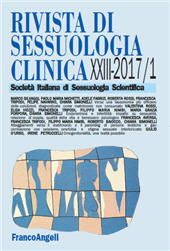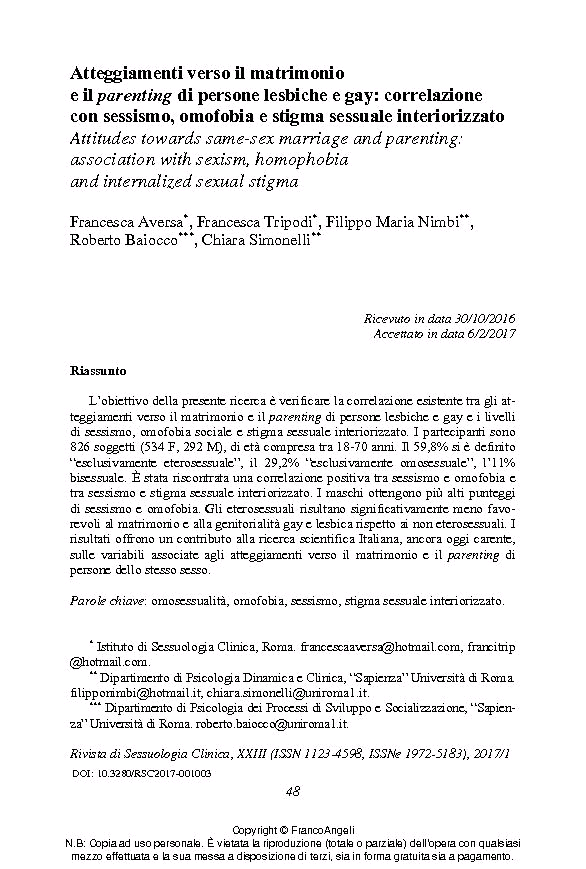2017 - Franco Angeli
Articolo
Versione Digitale
Download | Copia/incolla | Stampa
Atteggiamenti verso il matrimonio e il parenting di persone lesbiche e gay : correlazione con sessismo, omofobia e stigma sessuale interiorizzato
48-68 p.
- L'obiettivo della presente ricerca è verificare la correlazione esistente tra gli at-teggiamenti verso il matrimonio e il parenting di persone lesbiche e gay e i livelli di sessismo, omofobia sociale e stigma sessuale interiorizzato. I partecipanti sono 826 soggetti (534 F, 292 M), di età compresa tra 18-70 anni. Il 59,8% si è definito "esclusivamente eterosessuale", il 29,2% "esclusivamente omosessuale", l'11% bisessuale. È stata riscontrata una correlazione positiva tra sessismo e omofobia e tra sessismo e stigma sessuale interiorizzato. I maschi ottengono più alti punteggi di sessismo e omofobia. Gli eterosessuali risultano significativamente meno favo-revoli al matrimonio e alla genitorialità gay e lesbica rispetto ai non eterosessuali. I risultati offrono un contributo alla ricerca scientifica Italiana, ancora oggi carente, sulle variabili associate agli atteggiamenti verso il matrimonio e il parenting di persone dello stesso sesso. [Testo dell'editore].
- The objective of the present study is to explore the correlation between the atti-tudes towards marriage and parenting of lesbians and gays and levels of sexism, social homophobia and internalized sexual stigma. The participants were 826 (534 F, 292 M), aged between 18 and 70. The 59.8% defined him/her-self as "exclusively heterosexual", 29.2% as "exclusively homosexual" and 11% as "bisexual". Positive correlations have been found between: sexism and homophobia, and sexism and internalized sexual stigma. Male subjects obtained higher scores in sex-ism and homophobia. Heterosexuals were significantly less favorable regarding gay and lesbian marriage and parenthood compared to the homosexuals. The results offer a contribute to scientific research which still has significant gaps regarding the attitude-associated variables towards marriage and parenting between people of the same gender. Sexual education at schools and clinic supervision interventions should take these evidences into account. [Publisher's Text].
Fa parte di
Rivista di sessuologia clinica : 1, 2017-
Informazioni
Codice DOI: 10.3280/RSC2017-001003
ISSN: 1972-5183
PAROLE CHIAVE
- Omosessualità, omofobia, sessismo, stigma sessuale interiorizzato
- Homosexuality, homophobia, sexism, internalized sexual stigma
-
Nello stesso fascicolo
- Verso una tassonomia più efficace delle condizioni diagnosticate come matrimonio non consumato
- Endometriosi e infertilità : impatto su sessualità, relazione di coppia, qualità della vita e benessere psicologico
- Atteggiamenti verso il matrimonio e il parenting di persone lesbiche e gay : correlazione con sessismo, omofobia e stigma sessuale interiorizzato
- Omogenitorialità, una realtà possibile
- Recensioni
- Segnalazioni bibliografiche ; Convegni



